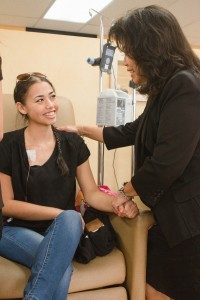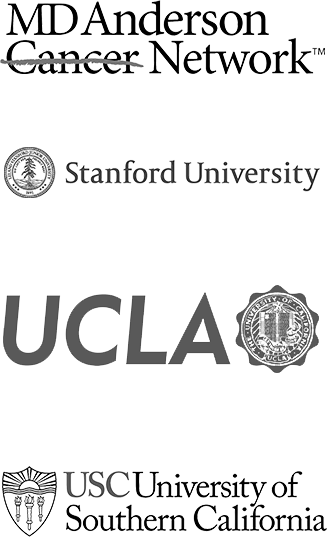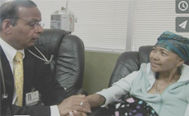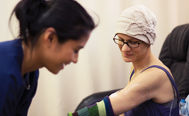Breast Cancer
 Breast cancer develops when overactive cells have grown uncontrollably to create diseased tissue. Cancer can form either in the breast tissue, primarily in the milk ducts (ductal carcinoma) or glands (lobular carcinoma). If a lump is found, it might be benign but it is critically important to biopsy the growth to confirm whether the tumor is malignant. A cancer can travel through the breast tissue to other parts of the breast and possibly metastasize by traveling through the bloodstream to other parts of the body.
Breast cancer develops when overactive cells have grown uncontrollably to create diseased tissue. Cancer can form either in the breast tissue, primarily in the milk ducts (ductal carcinoma) or glands (lobular carcinoma). If a lump is found, it might be benign but it is critically important to biopsy the growth to confirm whether the tumor is malignant. A cancer can travel through the breast tissue to other parts of the breast and possibly metastasize by traveling through the bloodstream to other parts of the body.
Type of breast cancer is determined by site of the original tumor and its cellular make-up. Different types of breast tumors grow and spread at different rates — some take years to spread beyond the breast while others grow and spread quickly.
The type and growth rate of breast cancer can only be determined by a consultation and examination from a physician. The best strategy for early diagnosis is prompt attention to unusual symptoms and knowing family medical history. If a tumor is suspected, a specialist must be consulted.
The Cancer Center of Southern California specializes in cancer care from diagnosis to treatment and recovery with the belief that compassion and mutual respect are essential for success in all the dimensions of cancer care. Dr. Sant Chawla and the Los Angeles oncology team follow a multi-disciplinary approach to treatment and partner with each patient encouraging them to participate in their own medical care and make informed decisions.

Common Symptoms
In many instances, a tumor is benign but if it is cancerous, there usually are not any signs of cancer in a tumor’s early stage. As a cancer grows, a process known as carcinogenesis, there are some common signs which include:
- Persistent lump in the breast
- Swelling in the armpit
- Breast pain or tenderness
- Flattening or indentation on breast
- Changes to the breast: size, contour, texture or temperature
- Changes to the nipple: retraction, dimpling, itching, or ulceration
- Unusual discharge from the nipple
 If any of these symptoms occur, the first step is taking a biopsy of the growth. This will confirm whether a tumor is malignant or not. If the tumor is cancerous, additional tests are done to determine if the cancer has spread beyond the breast and its response to different treatments. If the cancer is diagnosed at an early stage, an effective treatment plan could be developed; however, malignant tumors are usually discovered at a later stage of development when the symptoms are pronounced.
If any of these symptoms occur, the first step is taking a biopsy of the growth. This will confirm whether a tumor is malignant or not. If the tumor is cancerous, additional tests are done to determine if the cancer has spread beyond the breast and its response to different treatments. If the cancer is diagnosed at an early stage, an effective treatment plan could be developed; however, malignant tumors are usually discovered at a later stage of development when the symptoms are pronounced.
Prevention
Preventative actions against breast cancer can be taken. Well-known precautions include scheduling regular mammogram screenings and knowing the disease’s risk factors. Breast self-examination is another important preventative measure. Periodic self-examinations develops self-awareness and sensitivity to any irregular physical changes.
Risk Factors
Odds of developing breast cancer can increase if a woman has any of the following risk factors:
- Age
- Never had children
- History of radiation to the chest area
- Family history (especially mother, sister, daughter) of ovarian and/or breast cancer
- Began menopause after age 55
- Hormone therapy after menopause
- Previous abnormal breast biopsy results
- Obesity or weight gain after menopause
- Lifestyle factors
- Diet high in saturated fats
- Oral contraceptive use (birth control pills)
- Insufficient exercise
If a woman has any of the risk factors then preventative action can be taken. Increasing the frequency and number of tests such as mammograms and MRIs. In instances where breast cancer has occurred in the family, genetic testing can be considered.
Mammogram Screenings
Yearly mammograms have become the primary method for breast cancer screening. However, other exams including MRIs and genetic testing are taken depending on a woman’s individual and family history.
Treatment for Breast Tumors
Treatment options are determined by the stage and type of breast cancer. It is critical for a patient to first discuss all treatment options as well as possible side effects with their medical team.
Treatment can include one, and possibly a combination, of the following:
- Chemotherapy
- Novel therapies
- Radiation therapy
- Surgery
In some cases, certain clinical trial drugs may be available to patients. The Cancer Center physicians are leaders in cancer drug research and clinical trials working with the newest, most advanced drugs and, through this involvement, we can offer the most advanced treatment plan for each individual.
When developing a treatment plan, the Cancer Center evaluates the stage and grade of the tumor, previous treatments (if any), extent of the cancer, biopsy results, and other unique factors. We develop the most effective multi-modal treatment plans for our patients with the collaboration of prominent pathologists, general oncologists, surgeons, radiologists, and radiation oncologists from institutions such as UCLA, USC, Stanford, M.D. Anderson, St. John’s and Cedars Sinai.
Clinical Trials
As leaders in advanced clinical research and trials, we are able to exceed standard treatment whenever needed.
Dr. Chawla is the international principal investigator of Eribulin, which is the most effective treatment for metastatic breast tumors. Clinical trials for this medicine were sponsored by Eisai, Inc. and the drug was approved by the FDA and EMA.
Learn more about breast cancer from WebMD.com.
Contact the Oncology Experts for Treatment Information
Our physicians and staff partner with patients throughout treatment encouraging them to participate in their own medical care. We are deeply committed to the physical and emotional care of our patients and offer personalized attention. Women’s breast cancer in Santa Monica is a large commitment we are willing to guide you through.
For more information about the center or to schedule a consultation with one of our Los Angeles physicians, please contact us at 310-552-9999.
Next, read about lymphomas.



